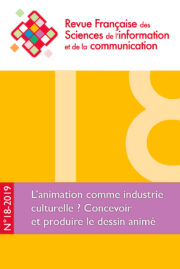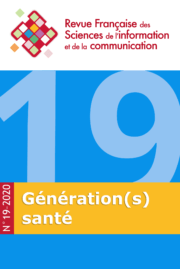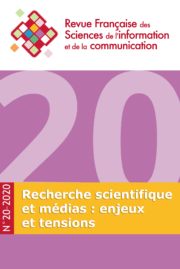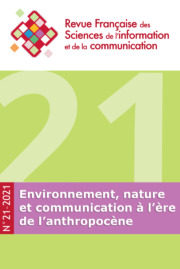Presentation
The Revue Française des Sciences de l’Information et de la Communication (RFSIC in short) is aimed at an international audience of researchers, teachers and professionals in the information and communication field, all specialties included.
Following the long editorial tradition of the SFSIC, the Revue Française des Sciences de l’Information et de la Communication (RFSIC) has the specificity of being a journal emanating from a learned society whose orientation is given by the Board of Directors. It reports on scientific advances and emerging research in the various fields of information and communication sciences. In addition to this demanding editorial work, the RFSIC pays attention to the promotion of the activities of research teams, journals, training courses, study groups, related associations, and foreign colleagues and collectives; all of these promotion activities conform to the SFSIC’s commitments as a learned society representing a community of stakeholders.
The Revue française des Sciences de l’Information et de la Communication (RFSIC) publishes three issues per year and is available on OpenEdition.
The RFSIC meets the criteria of a rank A qualifying journal: editorial board, international scientific committee, double-blind selection of articles, and periodicity. It is therefore registered on the list of qualifying journals adopted by the CNU 71st (National Council of Universities 71st), the CPDirSIC (Permanent Conference of Directors of Research Units in Information and Communication Sciences) and the SFSIC.
The RFSIC is recognized by the International Communication Association (ICA) as an affiliated journal.
Read the Journal
Sections and Themes
The summary consists of a dossier and seven sections:
- A thematic section presented by one or more scientific coordinators.
- “Spicilège”: a section which highlights works related to new problematics in Information and Communication Sciences.
- “Regards Croisés”: A section that presents the community with reflections on the positioning of French Information and Communication Sciences (ICS) in comparison with other communication disciplines at an international level.
- “Vie des Labos”: a section covering the latest news from research teams in Information and Communication Sciences on an international level.
- “Ligne Sud” is a section whose objective is to promote and valorize scientific exchange policies between Africa and France, and even Europe.
- “Revue des Revues”: a presentation of scientific reviews in Information and Communication Sciences
- “Data paper” : this section aims to promote new forms of scientific production by showing the data mobilized during research.
- “Publications” : Book Reviews
The texts proposed for the dossier as well as “Spicilège”, “Regards croisés”, “Ligne Sud” and “Data Paper” are subject to anonymous double proofreading. The sections “Vie des labos” and “Revue des revues” include guest posts.
Contribute to the RFSIC
Suggest the RFSIC a thematic dossier
RFSIC’s dossiers are intended to provide an overview of the progress made in information and communication sciences, to identify, construct, and anticipate major research problematics, and to help create the conditions for international scientific visibility and recognition of our disciplines.
Our editorial form is a dossier that gathers original contributions deemed to conform with the proposed theme and with our evaluation criteria. The proposed text (between 6 and 8,000 characters), in French and English, must include: a call for papers, and a scientific committee proposal to be validated by the editorial committee (8, including 3 internationals), and a schedule.
Contributions to the dossiers (between 30 and 40,000 characters) will have to be submitted to the double-blind procedure by members of the scientific committee specially constituted for each dossier.
The agenda of the dossiers under preparation is available at the following address: journals.openedition.org
Suggest an article for the RFSIC sections
The “Spicilèges”, “Regards croisés”, “Ligne Sud”, and “Data Paper” sections bring together contributions that, in dealing with unique subjects, attempt to address original problematics and emerging research questionings likely to challenge researchers in our disciplines. The texts of the contributions to these sections will be submitted to the double-blind procedure by members of the journal’s scientific committee.
-
“Spicilèges” section: Proposals for articles between 30 and 40,000 characters to be sent to Gino Gramaccia et Mélanie Bourdaa
- “Regards Croisés” section: projects of 3000 characters to be sent to the person in charge of the section Fabien Bonnet. Final text of 20 000 characters
- Data Paper : proposals to be sent to Olivier Le Deuff and Gérald Kembellec, coordinators of the section
- “Vie des labos” section: projects to be sent to Mélanie Bourdaa,
section coordinator
-
Revue des Revues: projects to be sent to Bruno Chaudet,
coordinator of the section
Writing guidelines
All texts must be prefaced by a summary and keywords, both in French and in English. They must follow the editorial guidelines of the journal, which can be found at: rfsic.revues.org
Commitees’ Functioning
The editorial committee’s mission is to define and implement the editorial and scientific policy of the journal in agreement with the SFSIC Board of Directors. It rules over the scientific interest of the files proposed by researchers in Information and Communication Sciences.
The composition of the Scientific Expertise Committee is updated every year. This committee of national and international researchers incorporates the researchers who have directed a file. It reflects all the fields, research issues, and sensitivities of information and communication sciences.
The list of reviewers in double anonymous expertise, coming from the Scientific Expertise Committee, is constituted in agreement with the Editorial Committee.
Commitees’ organization
Director of the Publication
- Philippe BONFILS, Président de la SFSIC
Heads of Editorial Committee
- Gino GRAMACCIA
- Mélanie BOURDAA
- Christian LE MOËNNE
Members of the editorial committee
- Fabien BONNET
- Bruno CHAUDET
- Sarah CORDONNIER
- Laurence CORROY
- Delphine DUPRE
- Sidonie GALLOT
- Alain KIYINDOU
- Benoit LAFON
- Julien PÉQUIGNOT
- Daniel RAICHVARG
- Claire SCOPSI
- Carsten WILHELM
Reviewers
Consult the up-to-date list at the following address RFSIC.revues.org
Terms of Use
The content of the Revue française des sciences de l’information et de la communication is available under the terms of the Creative Commons Attribution-Non Commercial-Share Alike License 4.0 International. > Full information about the journal is available on the OpenEdition catalog record.



